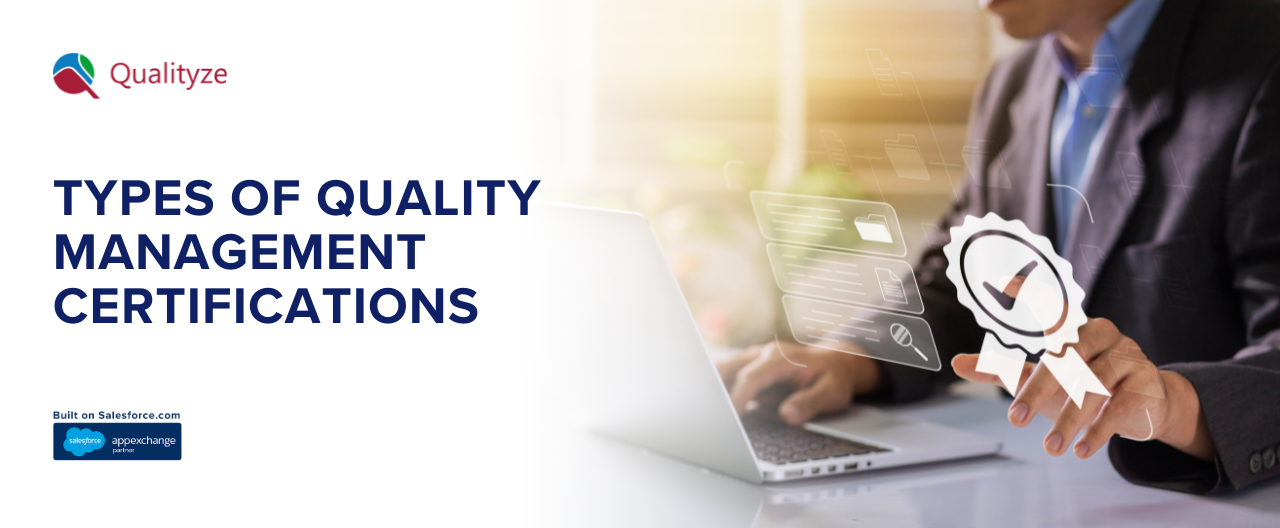


As the business world becomes increasingly risk-heavy and regulated today, quality assurance is not only a compliance function anymore—it's a strategic game-changer. While businesses expand operations, go global, and confront compressing regulatory demands, marrying with established standards becomes mission-critical. That is where quality management certification comes in—not merely as an affirmation, but as a driver of operational strength and market confidence.
These certifications are not just credentials; they're assurance that your teams, processes, and systems are founded on universally recognized best practices. Whether you work in life sciences, automotive, manufacturing, or aerospace, obtaining the right certification reflects organizational maturity, risk-readiness, and long-term excellence commitment.
In this blog, we'll dissect what a quality management certification really is, discuss why it's important, look at global standards, compare top programs such as ISO 9001 lead auditor certification and Six Sigma certification levels, and help you decide what's best for you. We'll also unravel increasing benefits and future directions in this arena.
A quality management certification is more than a professional designation—it's an official recognition that your company can reliably satisfy both customer requirements and regulatory standards. It's an expression of a forward-thinking dedication to advancing quality, efficiency, and risk mitigation through all levels of your business.
These certifications are generally founded upon globally accepted standards and frameworks. They give organizations systematic, data-driven procedures that facilitate streamlined workflows, error reduction, and enhanced stakeholder trust.
Whether you're creating quality systems from the ground up or expanding your current framework, the correct certification provides the basis for measurable, long-term growth.
From the fact files! More than 1.2 million organizations globally are ISO 9001 certified, with it being the most used quality management system standard in existence today.
Before choosing a certification, it's important to understand its purpose. A quality management certification is not merely a badge—it's a validation of your organization’s ability to consistently meet customer and regulatory requirements.
These certifications serve as the foundation for businesses aiming to strengthen internal processes, improve product reliability, and exceed market expectations. By aligning with recognized standards, companies and professionals gain measurable advantages that go beyond compliance.
Did you know? More than 1.2 million organizations globally are ISO 9001 certified, and it is the most widely used QMS standard in the world.
Now that we know what these certifications represent, let's discuss the reasons they are crucial to continued business excellence.
Why get certified? Because it enhances credibility, enhances internal processes, and builds customer confidence. In regulated industries, a quality management certification is sometimes a pre-requisite for conducting business.
For companies:
For professionals:
From the fact files! 9% greater revenue growth is reported by certified quality system companies compared to non-certified companies.
A culture of quality results in improved decision-making, fewer mistakes, and improved performance metrics.
With benefits now clearly established, let's dive into the frameworks upon which these certifications are based.
All quality management certification programs are constructed on globally accepted standards ensuring consistency, responsibility, and efficiency. Organisations are provided with the strategy and framework by these standards to adopt quality-oriented systems.
A few of the most essential standards are:
Having gained an insight into the standards, let's now see the various kinds of certifications offered to professionals and organizations.
It's overwhelming to navigate the various quality management certifications, but each one addresses a particular role or industry requirement. Choosing the right one will depend on your objectives and operating context.
The following are popularly accepted ones:
Ideal for professionals with responsibility to audit QMS against ISO 9001 standards.
Concentrates on engineering principles, quality control, risk management, and analysis.
Instructs on conducting process audits, documenting results, and maintaining compliance.
Applicable for top leaders who desire to promote quality across the enterprise.
Knowing these possibilities lays the ground for an important choice—how do you select the most suitable certification for you?
Selecting the most appropriate certification is not merely about reputation—it's strategic fit. The most appropriate certification gives professionals the capability to make significant contributions to business performance.
Here's how to make the decision:
Now, let's find certifications that are not only worthwhile but also recognized everywhere.
Recognition translates to applicability. These certifications are globally recognized and appreciated:
These globally accredited credentials are frequently a mandatory requirement in international tenders, supplier contracts, and audits.
After you've chosen your certification, the next thing to do is find where credible institutions are that you can get it from.
Certifications only stand as strong as the issuing body. Make sure you use recognized training suppliers and accrediting agencies.
Here are some best sources:
Did you know? Some companies actually integrate training modules into their EQMS to provide real-time certification alignment.
You know where to become certified, but what exactly does the certification unlock for your organization or career?
The advantages of certification extend far beyond the resume. They mean measurable career and business rewards.
For individuals:
For organizations:
For the records! Certified professionals experience an average salary increase of $7,500 after certification.
Quality management landscape is changing rapidly. Let's see what's next in certification.
Certifications are getting updated. As technology is being adopted by industries, certification schemes are also moving ahead.
Emerging trends are:
Micro-certifications for AI-based QMS, data analysis, and risk-based thinking
Hybrid training models with a mix of self-learning and instructor-led
Blockchain credentials for fraud-proof authentication
Compliance features integrated into EQMS platforms such as Qualityze
There are study estimates estimating that by 2027, 70% of employers will prefer digital or micro-credentials instead of paper certifications.
Let us conclude this trip with our last views and an invitation to proceed further.
In the ever-more regulated and performance-oriented world of today, quality management certification has emerged as an influential differentiator—not only for regulatory compliance, but for competitive advantage. These certifications confirm a business's dedication to providing consistent, high-quality results, create customer confidence, and provide access to new markets. From internationally recognized standards such as ISO 9001 and Six Sigma certification levels to industry-specific certifications such as ISO 13485 and IATF 16949, every route has a particular purpose in creating operational resilience. Organizations that spend money on certification not only enhance internal operations and team productivity but also cut risks and increase stakeholder involvement. Professionals gain a solid basis for leadership, career advancement, and technical expertise in their industry. The path to certification is no longer merely passing audit—but establishing a culture of excellence, responsibility, and enduring success.
Key Takeaways
Why Qualityze?
At Qualityze, we assist organizations in not only achieving quality standards—but surpassing them. Our cloud-based intelligenthosted EQMS is designed specifically to map to international certification standards, providing seamless integration, real-time audit trails, and scalable workflows optimized for compliance excellence.
Ready to accelerate your certification process, simplify it, and have it audit-ready from Day One?
Schedule your custom demo with Qualityze today and discover how our intelligent EQMS drives your compliance success.
Take the first step toward certification success.
Your journey to industry leadership begins with the proper tools and know-how. Select smarter. Certify quicker. Lead with Qualityze.
Author

Qualityze Editorial is the unified voice of Qualityze, sharing expert insights on quality excellence, regulatory compliance, and enterprise digitalization. Backed by deep industry expertise, our content empowers life sciences and regulated organizations to navigate complex regulations, optimize quality systems, and achieve operational excellence.
Calculate your potential savings with our ROI Calculator
ROI Calculator